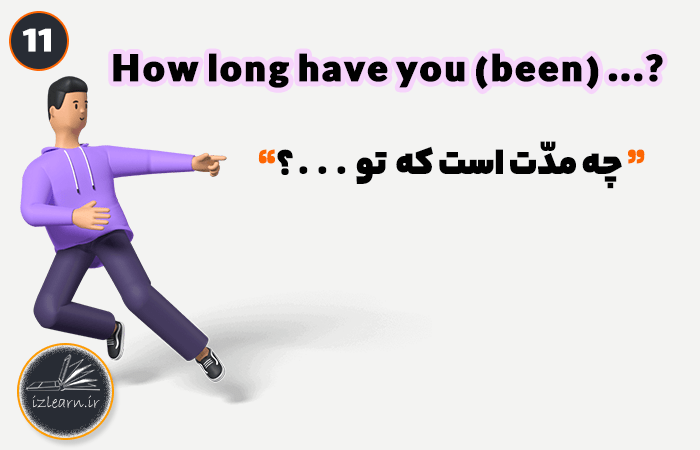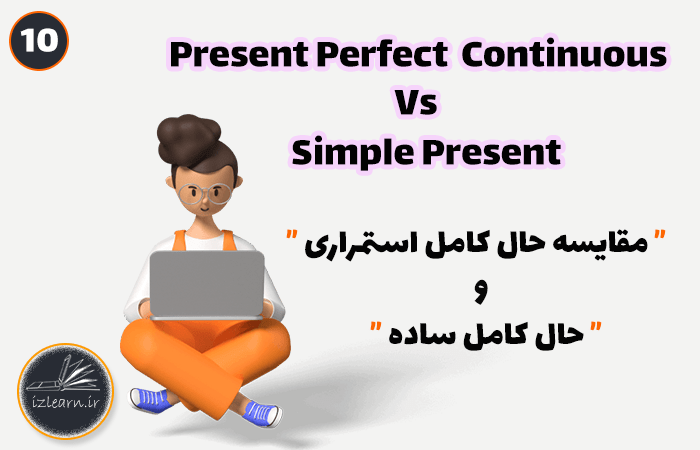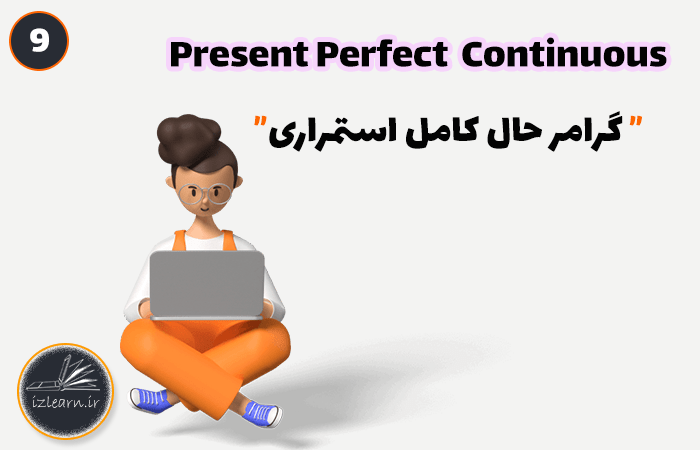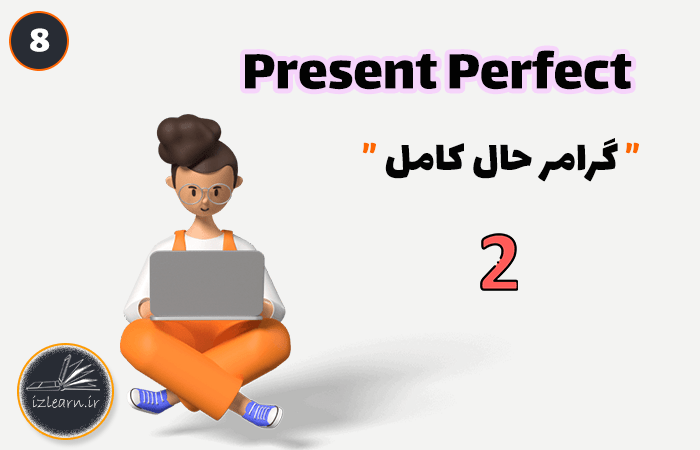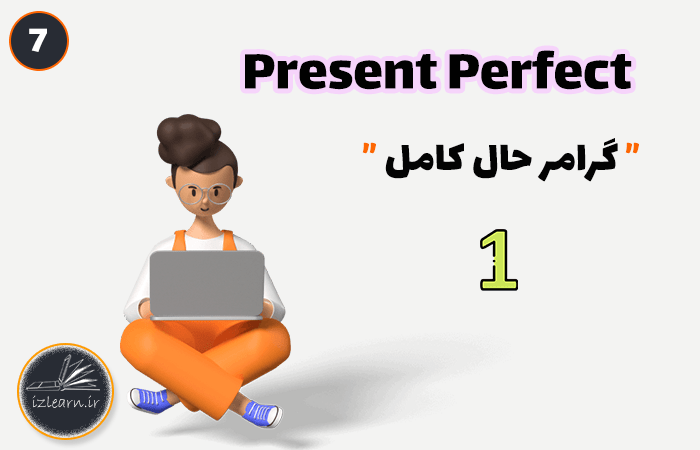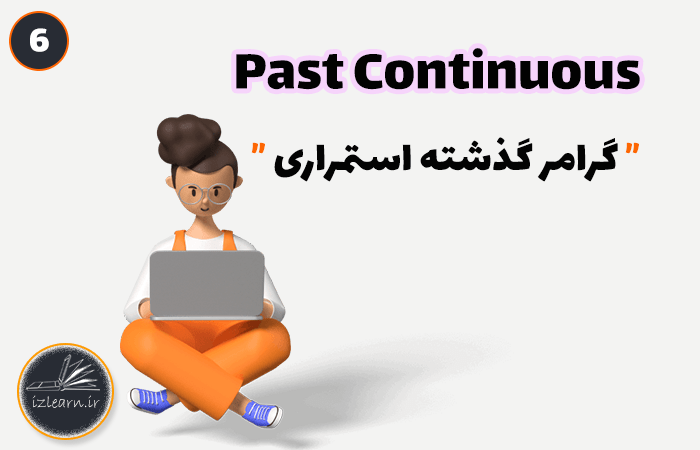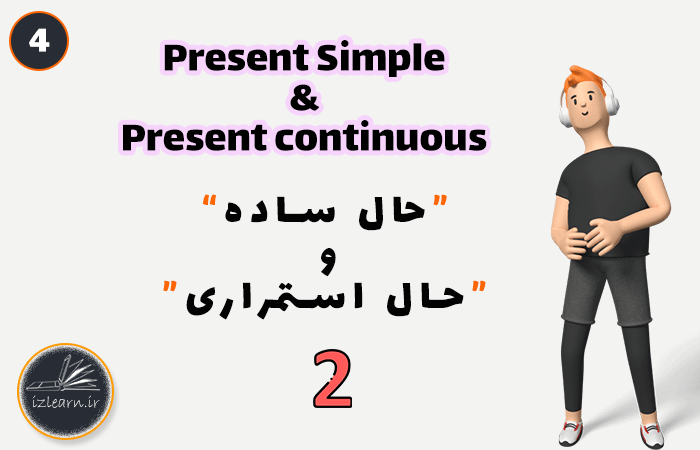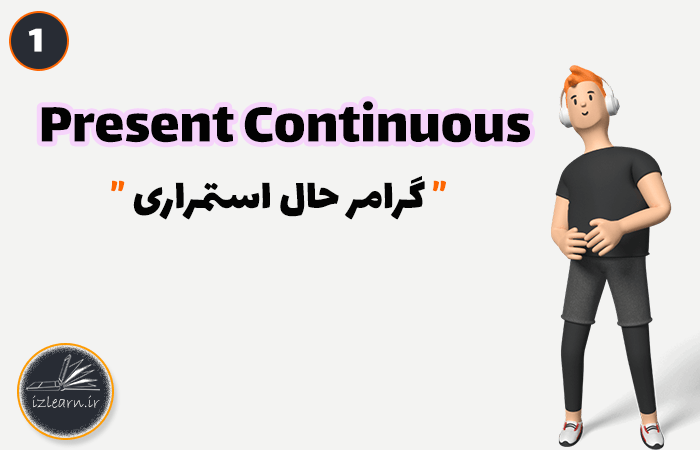
♦ عنوان: present continuous و simple present – قسمت اوّل
♦ درس: 03
♦ مرجع: کتاب Grammar in Use سطح متوسط (intermediate)
♥ در این مقاله قصد داریم تا یک مقایسه بین دو زمان حال ساده (simple present) و حال استمراری (present continuous) داشته باشیم.
مقایسه:
1) present continuous (I am doing)
تصویر(1) – حال استمراری
- با توجه به تصویر بالا، ما از حالت استمراری، زمانی استفاده می کنیم که درباره ی اتفاقی که در حال حاضر در حال رخ دادن باشد صحبت می کنیم.
بریم چنتا مثال برای حال استمراری باهم ببینیم؛
2) The water is boiling. Be careful. (در حال حاضر در حال جوشیدن است)
3) Listen to those people. What language are they speaking? (در حال حاضر)
4) Let’s go out. it isn’t raining anymore.(در حال حاضر دیگر باران نمی بارد)
5) ” I’m busy. ” ” What are you doing? ” (در حال حاضر داری چیکار میکنی؟)
6) I’m getting hungry. Let’s go and eat. (در حال حاضر داره گشنم میشه)
7) Kate wants to work in Italy, so she‘s learning Italian. (در حال حاضر داره ایتالیایی یاد میگیره)
8) The population of the world is increasing very fast. (جمعیت در حال حاضر در حال رشدکردن سریع است)
- ما از حال استمراری برای اتفاقات یا شرایط موقتی (temporary) یا اتفاقاتی که برای مدت کوتاهی ادامه پیدا می کنند، استفاده می کنیم.
به طور مثال؛
9) I‘m living with some friends until I find a place of my own.
توضیح: من در حال حاضر (موقتاً) تا زمانی که یک جا برای خودم پیدا کنم، با دوستانم در حال زندگی کردن می باشم.
10) A: ” You‘re working hard today. “
B: ” Yes. I have a lot to do.”
توضیح: شخص A میگه که؛ ” امروزی داری خیلی سخت کار می کنی؟” بعد شخص B در جوابش میگه که؛ ” آره خیلی کارا دارم که باید انجام بدم. ” یعنی امروز به صورت موقتی و کوتاه مدت چون صرفا کار زیاد داشته، داره سخت کار میکنه.
2) simple present ( I do )
تصویر(2) – حال ساده
- با توجه به نمودار زمانی بالا، ما زمانی از حال ساده (simple present)، که کار مورد نظر به صورت مکرّر تکرار شود ( یک حقیقت کلی را شامل شود)
بریم چنتا مثال برای حال ساده باهم ببینیم.
11) Water boils at 100 degrees Celsius. (همیشه درست است)
12) Excuse me, do you speak English? (در حالت کلّی آیا زبان انگلیسی میتونی صحبت کنی؟)
13) It doesn’t rain very much in summer. (یک حقیقت کلی درباره آن محل خاص است)
14) What do you usually do at weekends? (به صورت کلّی و معمول آخر هفته ها چیکار میکنی؟)
15) I always get hungry in the afternoon? (همیشه و تکرار شوند بعد از ظهر ها گشنه میشه)
16) Most people learn to swim when they are children. (یک حقیقت کلّی است)
17) Every day the population of the world increases by about 200,000 people. (یک حقیقت کلی است)
- ما از حال ساده، برای شرایط و اتفاقات دائمی (permanent) استفاده می کنیم. شرایطی که برای مدّت زیادی ادامه پیدا می کنند.
به طور مثال؛
18) My parents live in London. They have lived there all their lives.
توضیح: پدر مادر من در لندن زندگی می کنند. آنها تمام طول زندگی خود در آنجا (لندن) زندگی کرده اند.
19) Joe isn’t lazy. He works hard most of the time.
توضیح: جو آدم تنبلی نیست. او اغلب اوقات سخت تلاش می کند.
 نکته مهم گرامری!
نکته مهم گرامری!
سوال: به نظر شما تفاوت دو جمله I always do با I’m always doing از لحاظ معنایی چیست؟
خب بهترین کار اینه که توی مثال بررسی کنیم.
20) I always go to work by car. ( not I’m always going to …)
21) I’m always doing something = I do it too often or more often than normal
برای مثال: بسیار عالی! درباره جمله شماره 20 تا الان بسیار بحث کردیم پس مستقیماً سراع جمله 21 می رویم. این جمله غالباً بار معنایی منفی دارد و اینکه شما یک کاری را بیش از حد نرمال انجام دهید. مثلاً در جمله زیر داریم؛ من کلیدهایم را گم کرده ام. من همش در حال گم کردن آن هستم.( یک جور بار معنایی منفی دارد)
22) I’ve lost my keys again. I‘m always losing them.
ترجمه: من کلیدهایم را گم کرده ام، من همش در حال گم کردن آنها هستم. اجاره بدید که چنتا مثال دیگه از این بخش هم داشته باشیم.
23) Paul is never satisfied. He‘s always complaining.
ترجمه: پائول هیچوفت راضی نمی شود. او همش در حال شکایت کردن (غرزدن) است.
24) You‘re always looking at your phone. Don’t you have anything else to do?
ترجمه: تو همش در حال نگاه کردن به گوشیت هستی. هیچ کاره دیگه ای نداری که انجام بدی؟
 Exercises | تمارین
Exercises | تمارین
3.1) Are the underlined verbs Ok? Correct them where necessary.
1. Water boils at 100 degrees Celsius. (Ok)
2. How often are you going to the cinema. ( How often do you go to …)
3. Ben tries to find a job, but he hasn’t had any luck yet. (Ben is trying to …)
4. Martina is phoning her mother every day. (Martina phones her mother …)
5. The moon goes round the earth in about 27 days. (Ok)
6. Can you hear those people? What do they talk about? (What are they talking …)
7. What do you do in your spare time? (Ok)
8. Sarah is a vegetarian. She doesn’t eat meat. (Ok)
9. I must go now. It gets late. (It’s getting late)
10. “Come on!” It’s time to leave. “Ok. I come” (I’m coming)
11. Paul is never late. He’s always starting work on time. (He always starts work …)
12. They don’t get on well. They’re always arguing. (Ok)
3.2) put the verbs into the correct form, present continuous or present simple.
1. (a) I usually get ( I / usually / get) hungry in the afternoon.
(b) I‘m getting (I / get) hungry. Let’s go and eat something.
2. (a) Are you listening (you / listen) to the radio? ” No, you can turn it off.
(b) Do you listen (you / listen ) to the radio a lot? “No, not very often.”
3. (a) The River Nile flows (flow) into the Mediterranean.
(b) The river is flowing very fast today-much faster than usual.
4. (a) I’m not very active. I don’t do (I / not / do) any sport.
(b) What do you usually do (you / usually / do) at weekends?
5. (a) Rachel is in New York right now. She‘s staying (She / stay) at the Park Hotel.
(b) She always stays (She / always / stay) there when she’s in New York.
3.3) Put the verb into the correct form, present continuous or present simple.
1. Why are all these people here? What’s happening? (What / happen)
2. Julia is good at languages. She speaks (She / speak) four languages.
3. Are you ready yet? Everybody is waiting (Everybody / wait) for you.
4. I’ve never heard this word. How do you pronounce (you / pronounce) it?
5. Kate isn’t working (not / work) this week. She’s on holiday.
6. I think my English is improving (improve) slowly. It’s better than it was.
7. Nicola lives (live) in Manchester. She has never lived anywhere else.
8. Can we stop walking soon? I’m starting (I / start) to get tired.
9. Sam and Tina are in Madrid right now. They’re visiting (They / visit) a friend of theirs.
10. ” What does your father do (your father / do)? ” ” He’s an architect.”
11. It took me an hour to get to work this morning. Most days it doesn’t take (it / not / take) so long.
12. I‘m learning (I / learn) to drive. My driving test is next month. My father is teaching (teach) me.
3.4) Finish B’s sentences. Use [ always + ing ]
1. A: I’ve lost my keys again.
B: Not again. You’re always losing your keys.
2. A: The car has broken down again.
B: That car is useless. It’s always breaking down.
3. A: Look! You’ve made the same mistake again.
B: Oh no, not again! I’m always making the same mistake.
4. A: Oh, I’ve left my phones at home again.
B: Typical! You’re always leaving your phones at home.
 | New words for this lesson | کلمات جدید این درس
| New words for this lesson | کلمات جدید این درس



